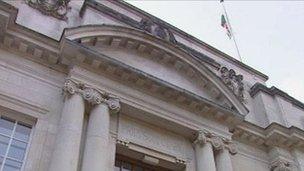After scandal, what happens now to University of Wales?
- Published

The 120-year-old University of Wales has hailed a "new beginning"
What do the credit crunch and the University of Wales (UoW) have in common?
According to one senior source in Welsh higher education, the financial markets and the UoW were both toppled when the factor that sustained their businesses was found to be flawed.
Banks were undone by their reliance on suspicious mortgages. In the UoW's case, it was suspicious colleges.
"It was what you could call a sub-prime academic market," the source said.
"It was a market that other people would not touch. They expanded the business by moving more and more into high-risk areas."
By 2008 more than 20,000 students were registered on UoW-validated courses in 30 countries, generating overseas earnings of more than £2m.
'High risk'
But there were warnings about the enterprise.
In March, the Welsh government-commissioned McCormick review described the situation as "high risk" and said the university should be wound down if other plans for its future fail.
Geraint Talfan Davies, a member of the review, said: "I think that everybody has been aware of some of the risks involved in the University of Wales' overseas activities.
"Validating at distance provides some real challenges, governance challenges, and that goes for everybody.
"The difficulty with the University of Wales was that it was on a pretty big scale and doing it on that scale makes it more difficult."
Problems were laid bare by a BBC Wales investigation into an alleged visa scam at a college offering UoW-validated courses in London.
The scandal quickly led to calls for the university to be scrapped, including from Education Minister Leighton Andrews. Although the UoW had already announced it would stop validating courses at all other institutions in the UK and abroad, it was not enough to stem the tide of criticism.
Last Friday, the UoW was effectively abolished.
It will merge with Trinity St David and Swansea Metropolitan universities, unifying under the 1822 Royal Charger of Trinity Saint David, not the 1893 charter of the University of Wales.
Questions remain about what the new university will look like and what will happen to the UoW's assets.
The merger is expected to take place by August next year. A spokesman said the process was in its initial stages with meetings taking place between the various parties involved.
The UoW's name, at least, will live on. The merged institution will be called The University of Wales: Trinity Saint David. Its vice-chancellor, Medwin Hughes, has said the UoW name should not be "thrown away".
He has also sought to ease concern about institutions aligned with the UoW.
BBC Wales has spoken to academics who are unclear about what will happen to the University of Wales Press, the Centre for Advanced Welsh and Celtic Studies, the Dictionary of the Welsh Language and the Gregynog Hall conference centre in Powys.
"These institutions are completely crucial to Welsh scholarship," Prof Hughes said, adding that the new entity carried "a firm commitment to secure scholarship and activities".
A spokesman for the University and College Union said it would support mergers, as long as they do not include compulsory redundancies.
Mr Davies, chairman of the Institute of Welsh Affairs think tank and a former controller of BBC Wales, said it had become difficult to see how the old UoW could fit the "jigsaw" of higher education in Wales.
Its very name implied "a primacy in the sector which was not based on fact," he said.
"The important thing is getting the sector right, because it faces some absolutely massive challenges around the funding system, increasing marketisation in the higher education system in the UK," he said.

Gregynog Hall, near Newtown, is a University of Wales conference centre
Higher education cannot afford to be "distracted" from the issues facing it, he said.
There are those who feel the fate of the UoW should not be the biggest concern for a sector wrestling with questions about funding.
The vice-chancellor of Swansea University, Prof Richard B Davies, hopes the higher education world can move on quickly from the affair.
'Move on'
Prof Davies, who held tentative merger talks with the UoW, until it became clear early this year that the two sides could not agree, said: "There are bigger things to worry about and our concern has been how the UoW has damaged reputations across Wales.
"It's important to say this shouldn't be about blaming people but moving on and recovering from this situation as quickly as possible."
The Welsh government wants fewer universities - down from 11 to six - with the education minister telling institutions to "adapt or die".
But it is unlikely he would have wished for their numbers to be cut in such controversial fashion. This is hardly the "decent burial" he envisioned.
Within days of the merger announcement, it seemed even the Welsh government had stopped counting the UoW among Wales' universities.
During a visit to China this week, First Minister Carwyn Jones hailed a project to spread the expertise of Welsh universities in the country - the first time "all 10" universities in Wales had come together in this way. The UoW was not on the list.
It marks an abrupt end to UoW's 120 years as a stand-alone institution.
- Published21 October 2011
- Published19 October 2011
- Published19 October 2011
- Published12 October 2011
- Published12 October 2011
- Published7 October 2011
- Published6 October 2011
- Published5 October 2011
- Published5 October 2011